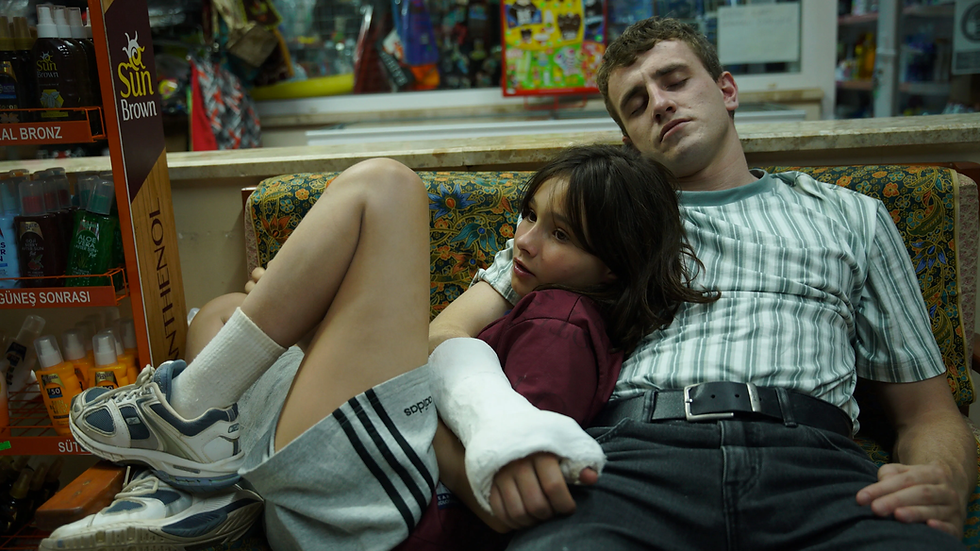Spinning Magic from Memory in Aftersun
- Jonny Diaz
- Oct 23, 2022
- 2 min read
Updated: Oct 24, 2022

Like many first-time feature filmmakers, Charlotte Wells mines her own history for dramatic effect in the charming and understated Aftersun, which has played to critical acclaim across the festival circuit. Unfolding with the patience of a slowly developing photograph, Aftersun recounts a young girl's (Frankie Corio) summer holiday with her father (Paul Mescal) at a Turkish resort town. Far from a paint-by-numbers tale of teenage awakening, Wells uses Aftersun to revisit her childhood through the prism of memory, with faded, fragmented images piecing together a child's-eye view of her past that lingers long after the credits have rolled.
I'll admit to initially being somewhat underwhelmed by the film's first thirty minutes or so. The pacing seemed almost distressingly slow, and I found myself perplexed by the critical hosannas that Aftersun had received (it didn't help that it was my fourth screening of a long festival day). But Wells's patient withholding of narrative momentum during the film's opening act immerses her audience in the push and pull of Calum and Sophie's relationship, which proves pivotal to the plot developments and emotional payoffs that come later on. And in the days since I saw Aftersun, I've been unable to shake it; the more I reflect on the film, the more it grows and deepens.
As Calum, a semi-estranged father desperate to maintain a relationship with his preteen daughter, Mescal executes an incredible tightrope walk, expertly playing both his character's cracking façade of "carefree vacation dad" and the emotional turmoil brimming just barely out of his daughter's view. And in her debut film, Corio is an absolute revelation as the eleven-year-old Sophie, flitting between shameless precociousness and burgeoning self-awareness with effortless charm and sly curiosity. Mescal and Corio's dynamic suggests a long history full of unspoken understandings and unresolved tensions. Their easy chemistry is the key to Aftersun's success; it's an authentic parent-child relationship that feels like it existed long before the cameras were rolling.
And it's that relationship—or Sophie's memory of it—that Wells is primarily concerned with, moving episodically through the holiday with an almost lyrical rhythm. The camerawork by Gregory Oke is warm and hazy, utilizing extensive home video footage taken by Sophie on a handheld camcorder and intercutting the resort-set scenes with disorienting, strobe-lit interludes of an older Sophie watching her father dance with abandon in a nightclub. The overall feeling is that of a once-pleasant memory now tinged with melancholy by the passage of time and the realization that children rarely, if ever, fully understand the inner emotional lives of their parents.
Wells is one of the most exciting young filmmakers I've encountered in recent years—it's no wonder that producer Barry Jenkins has been evangelizing her so effusively all year. I can't wait to see how her poetic visual style and knack for layered emotionality translates to her future projects, but even if they don't, I know I'll treasure Aftersun for a long time.
Aftersun is playing in select theaters now.




AfterSun evokes vivid emotional landscapes through its intimate storytelling and luminous cinematography, dazn streaming technology mirrors this artistry with low-latency playback and adaptive bitrate algorithms that preserve nuanced color gradients and subtle facial expressions, even under fluctuating bandwidth conditions. Viewers note that dazn’s pause-and-replay feature enhances critical moments, allowing audiences to savor EverySun’s poetic visual motifs.